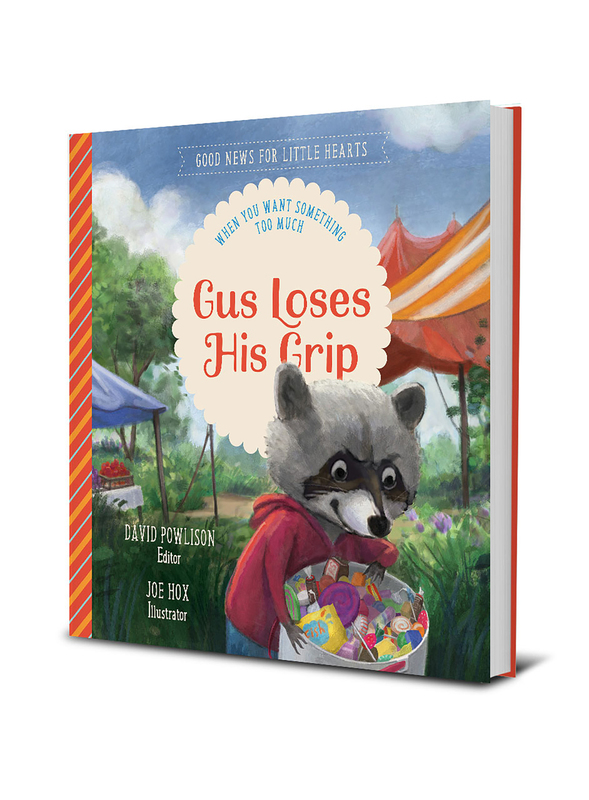When Michael, age seven, gets to play games and watch shows on his dad’s tablet, his smile lights up the room. But soon, the gift of playtime and gaming turns into an expectation—and then a demand. Even though he can play his games after school the next day, it’s not enough. He decides to sneak his dad’s tablet into bed at night and stay up late playing game after game. His father catches him, well past his bedtime, eyes glued to the screen.
Parents are familiar with this scene in some shape or form. No matter our age, we all struggle with wanting the gift more than the Giver. How do you help your child remember that temptation might be strong, but not too strong for Jesus? How do you invite your children to see a bigger, more intimate Jesus who forgives and helps us when we want something too much? How do we illustrate what it looks like to turn from temptation and live by faith in the day-to-day moments?
It’s easy for us to go from “I’d like to have” to “I must have.” It’s especially easy for children who haven’t quite figured out willpower or mastered the concept of self-control. Let’s call it a case of the “I wantsies.”
Often the “I wantsies” start with wanting a good thing—something sweet to eat (nothing wrong with that!), the love of someone special, a friendship, or even good health. But when we want even a good thing too much, it can take charge of us. It becomes the center of our focus.
For a child, it may be wanting more screen time or more candy from his Easter basket. They may even pick up this kind of behavior from us as parents. Maybe Dad likes to collect fishing equipment and Mom likes to pick up new items for the house. Helping your children with the “I wantsies” starts by acknowledging that you need help as much as they do. You can learn together about the grace and mercy of Jesus for people who want good things too much, as well as for people who want bad things.
Here are some truths for you and your children to remember when you are gripped by the “I wantsies.”
1. Our desire for something takes charge of what we think and do.
What starts as temptation can turn into something more. Going back to the example of the child and his Easter basket, wanting more and more chocolate eggs can lead to eating too much candy (and the tummy ache as a consequence), not telling the truth when caught, and eventually into sneaky behaviors. Maybe he even sneaks something out of the store without you knowing. Not every case goes that extreme, but you get the point. James says, “Temptation comes from our own desires, which entice us and drag us away. These desires give birth to sinful actions. And when sin is allowed to grow, it gives birth to death” (James 1:14–15). Here’s a rule of thumb: sins start out small, but they always grow bigger.
2. Our desires are powerful.
Our own power is not powerful enough to fight against temptation. What is powerful enough to set us free from wanting a good thing too much or from wanting a bad thing? The apostle Paul points us to Jesus, “Who will free me from this life that is dominated by sin and death? Thank God! The answer is in Jesus Christ our Lord” (Romans 7:24–25). The truth is that we can’t free ourselves from desires that have mastered us. Only Jesus can.
3. How does Jesus free us?
Remind your child of the sweet Easter story—Jesus died and rose from the dead so that all who believe in him will be forgiven and given a new life. The same power that raised Jesus from the dead is now ours when we trust in Jesus. Peter says, “God’s power has given us everything we need to lead a godly life. All of this has come to us because we know the God who chose us. He chose us because of his own glory and goodness. He has also given us his very great and valuable promises. He did it so you could share in his nature. You can share in it because you’ve escaped from the evil in the world. This evil is caused by sinful desires” (2 Peter 1:3–4). Because of Jesus’s death, we can be forgiven and because of his resurrection, we can be filled with God’s strength that changes even our deepest desires and makes us love what Jesus loves.
4. Living for what you want separates us from God and people.
We often hide our sins from the people we love, and sometimes we can’t be honest with them or God. But God gives us a way back to him—we can always turn and say “sorry” to him and to others. That’s what the Bible calls repentance. And repentance restores our relationship with God and with others. John says this “Suppose we claim we are without sin. Then we are fooling ourselves. The truth is not in us. But God is faithful and fair. If we confess our sins, he will forgive our sins. He will forgive every wrong thing we have done. He will make us pure (1 John 1:8–9 NIVR).
5. Keep on asking God for the gift of his Spirit.
Turning from your own way doesn’t happen just once. You turn to God every day. Jesus tells us to keep asking and seeking the help that we need from him (Luke 11:9–10). How does that help come to us? He goes on to say that our heavenly Father’s best gift to his children is his Spirit (Luke 11:13). As we turn to Jesus and ask for forgiveness and his Spirit, he fills us with the same power that raised Jesus from the dead. That’s the most powerful force in the universe. That is the power that can change our hearts, minds, and actions. That power can help Michael keep tablet games in the right place in his heart and can help us control our desires, too. It can also change your and your child’s struggle with the “wantsies.”
6. True pleasure comes from enjoying God and his good gifts.
After making sure gifts are in the right place in our hearts and asking for forgiveness when we place them above the Giver of good gifts, we can enjoy all the good things God puts in our lives. There is a whole world of pleasure waiting for us on the other side of going to God and saying sorry for how we turn from him and go our own way. When the power of God comes into our lives, we lose our grip on our own desires, and we can “Taste and see that the Lord is good” (Psalm 34:8). We take joy in knowing God, remembering that He is always faithful (Lamentation 3:22–23). As our joy in knowing God grows so does our joy in all of the good things he has given us.
The above content was adapted from Gus Loses His Grip: When You Want Something Too Much.






